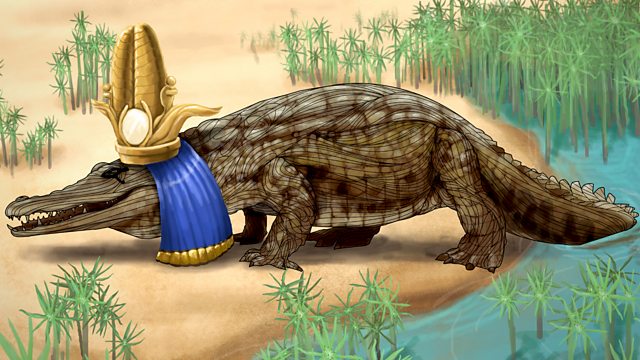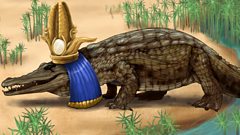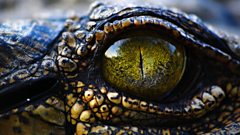Crocodiles
Brett Westwood explores the role crocodiles have played in literature, religion and fashion. From a god in ancient Egypt to a comic character in Peter Pan, crocs fascinate us.
Not many creatures can boast being a god, a sports logo, a sly trickster, a bringer of fertility, a producer of false tears and a comic book hero, but then not many animals have lived on earth for as long as the crocodile. It is a cold-bloodied killer, using crude techniques to crush and drown its prey, but it is a master of survival over millions of years. In the Nile, where they grow to 7 metres and 1000 kilogrammes, they were revered as gods; they even had their own city Crocodilopolis where mummified crocs were the subject of long, sacred rituals. Cleopatra viewed herself as a sexy crocodile devouring Mark Anthony. More recently they were used by JM Barrie in Peter Pan to bring us the much loved ticking time-bomb that silently chased Captain Cook. We are in awe of their lightning fast movements and cold, ruthless character. The famous tennis player Rene Lacoste was considered such a ferocious player he was nicknamed The Crocodile, and the iconic sports logo was born. Our relationship with crocodiles is complex, a mixture of fear and reverence. Today we are finding more about the non-predatory side of their lives - how they use tools and cooperate. The crocodile continues to beguile us.
Last on
Clips
-
![]()
The World According to Crocodile
Duration: 02:04
-
![]()
The truth about crocodile tears
Duration: 01:23
Dr Lorna Steel

Lorna’s work has been published in over 30 scientific journals including and .��
Before joining the Museum, Lorna worked at the Dinosaur Isle Museum in the Isle of Wight as an Education Officer and Assistant Curator.
Dr Adam Britton

Adam's recent work has included diving with Nile crocodiles in the Okavango Delta to collect DNA for a project on population dynamics, studying predatory behaviour by crocodiles on turtle nesting beaches in Far North Queensland, and training rangers in Australia and Indonesia on safe field methods to manage wild crocodile populations.
Adam also has a strong internet presence, having in 1994, and most recently building a worldwide database of crocodile attacks called .
Amber Butchart

She is an Associate Lecturer in Cultural & Historical Studies at London College of Fashion and her interest in antique clothing was ignited by working as Head Buyer for vintage clothing company Beyond Retro.
A former Research Fellow at the University of the Arts London, she is regularly asked to speak on fashion and cultural history, and has done so at the Institute for Contemporary Arts, British Museum, Royal Academy, British Library, Wellcome Collection, Design Museum, British Film Institute, and is a regular on the SHOWstudio fashion week panels. She is a member of the Royal Historical Society and the Association of Dress Historians.
Picture:
Sue Giles

The Egyptology collection at Bristol is among the top 10 in the country and she has catalogued much of the collection, collected new material, and worked on two Egypt galleries, one opened in 1982 and its replacement in 2007.
She also worked on the Bristol Mummy Project, when the rotting bandages of the mummy of a man named Hor-em-kenesi were archaeologically unwrapped from the body. She curated the exhibition and co-edited the Bristol Mummy Project publication.
Dr Salima Ikram

She has directed the , co-directed the Predynastic Gallery project, and has served as co-director of the and as director of the North Kharga Oasis Darb Ain Amur Survey.
Dr Ikram has worked on several excavations in Egypt as well as in the Sudan, Greece, and Turkey. Her research interests are diverse, ranging from death to rock art, and is currently very involved with the preservation and presentation of cultural heritage.
Professor Ralph Pite
He is currently writing a book about the poets, Robert Frost and Edward Thomas. They were close friends in the three years before Thomas’s death in 1917, at the Battle of Arras. Both men shared a love of nature and an interest in ‘the simple life’ – in ways of living, which we would call sustainable.
Broadcasts
- Tue 29 Sep 2015 11:00�鶹�� Radio 4
- Mon 5 Oct 2015 21:00�鶹�� Radio 4




